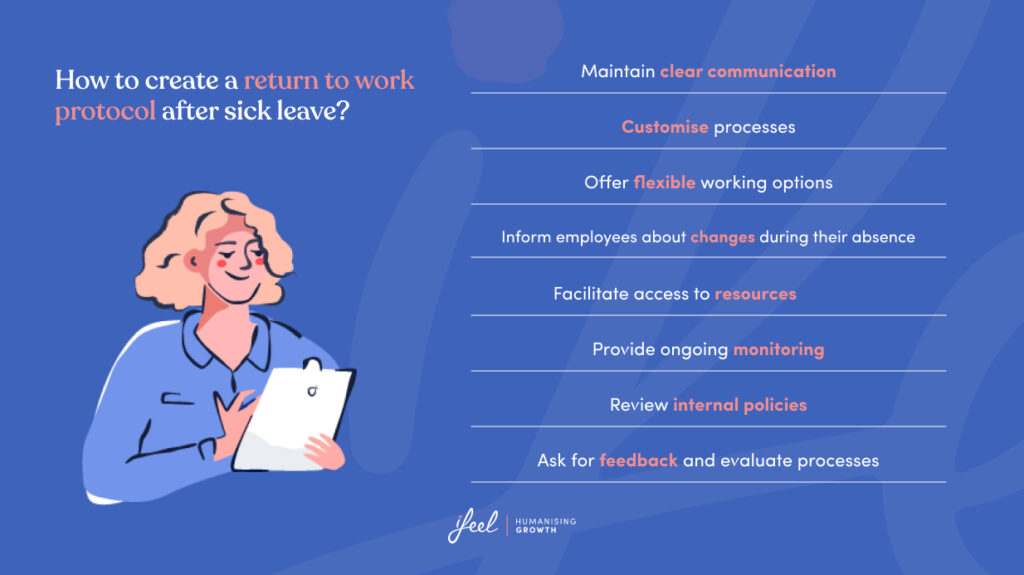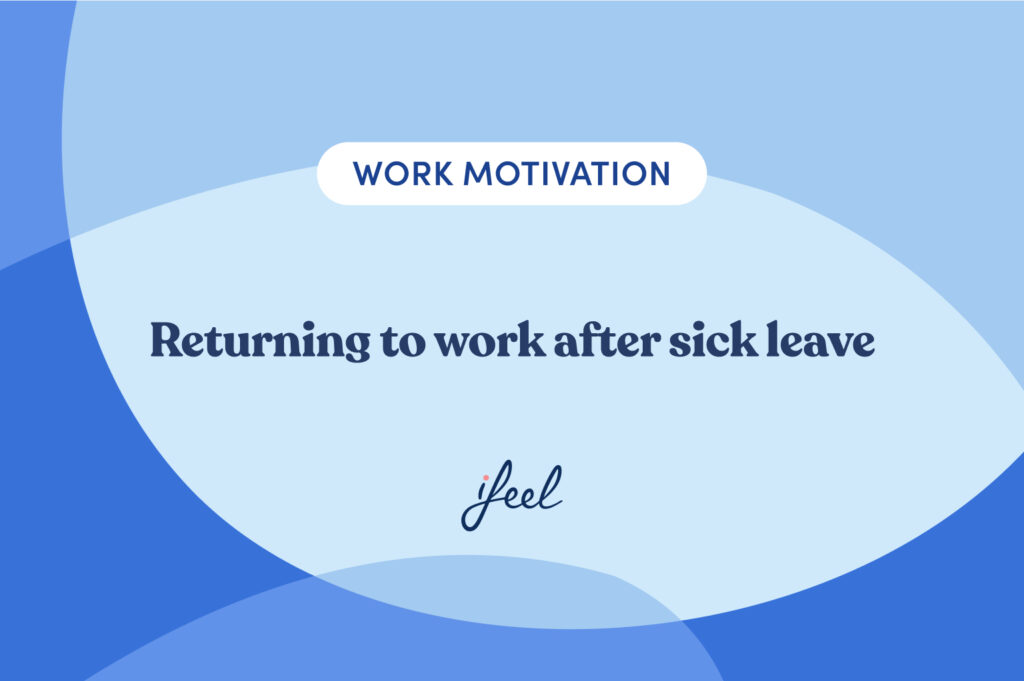Returning to work after sick leave implies a reunion with our role as employees after a necessary pause to recover strength, regain energy and gain momentum to try to be the professional we want to be.
When someone’s sick leave has been especially long, that is, several months, the isolation from work may have been so intense that resuming the activity needs a whole adjustment period. Read on to find out more.
Returning to work after sick leave
It may be due to a physical health problem, prolonged maternity due to breastfeeding (which may sometimes have included a large part of the pregnancy), or even a sabbatical leave. The periods that distance us from our work can have different causes and, therefore, different durations.
However, one of the most critical examples is to be found in the absences – especially if they are prolonged – due to a decline in our mental health. Although the situations can vary, general examples are leaves of absence due to anxiety, stress, or depression. Studies show that in the UK alone, the cost of absence to businesses is significant and is estimated at over £100bn per year. Moreover, an estimated 185.6 million working days were lost because of sickness or injury in 2022. Therefore, companies play a key role in preventing mental health issues and avoiding the increase in mental health sick leave from arising as they have a big impact on companies’ overall results.

“Mental and emotional well-being has always played a significant role for us and was never a topic we wanted to shy away from… a healthy mind is just as important to the wellbeing of employees. We also know that investing in wellbeing helps reach employees their full potential and benefits both people and organization.“
– HR Interview with Kalina Pleil, People Operations Specialist at Labster
Different ways to experience your return
If all goes well and the method works, there comes a time when the employee will be returning to work after sick leave.
Many people experience this moment as a return to everyday life after taking a break to care for themselves. However, many also experience it with a certain apprehension, fear, or stress at the prospect of not knowing how the return will affect them and what they will encounter once they return to work.
Indeed, in those months, time has not stood still. Before returning to work after sick leave, we continued on our own for a while, taking care of our well-being or trying to do so. So has the company, whose activities have not stopped: work has continued, just as decisions have continued to be made and strategies devised, in this case without our direct involvement.
When we return, a part of us puts the play button where the pause button was, but in reality, during this pause period, certain things have happened in the company that makes the scene different.
How to support an employee who is returning to work after sick leave
To make things easier for both the individual and the team, companies need to have a strategy to support the employee in returning to work after sick leave.
It does not have to be a complex strategy, nor must the support process be very long. It is enough to consider certain psychosocial risks that may hinder the return to work and specific measures to be taken to prevent and address them.

Employees returning to work after sick leave may not be as productive as before, but by providing support, you are allowing them to recover fully. In the long run, it will benefit the employees’ performance and the company’s results. The following table outlines how HR Managers and Line Managers can help employees adjust to returning to work after sick leave:
| HR Managers | Line Managers |
|---|---|
| Develop Return-to-Work Policies: | Provide Direct Support: |
| Create clear policies that outline the process for returning to work, including necessary documentation and steps. | Offer direct support and understanding to returning employees, ensuring they feel welcomed and valued. |
| Offer Flexible Work Options: | Monitor Progress: |
| Provide flexible work arrangements such as part-time hours, remote work, or adjusted schedules to ease the transition. | Regularly check in with the returning employee to monitor their progress and address any concerns. |
| Conduct Training and Awareness Programs: | Foster a Supportive Team Environment: |
| Train staff and management on supporting colleagues returning from sick leave to promote a culture of understanding. | Encourage the team to support and include the returning employee, fostering a positive work environment. |
| Facilitate Access to Employee Assistance Programs (EAP): | Provide Necessary Resources: |
| Ensure employees are aware of and can access EAP services for additional support, such as counseling. | Provide necessary tools and resources to help the employee effectively reintegrate into their role. |
| Track and Evaluate Return-to-Work Programs: | Set Realistic Goals: |
| Continuously track the effectiveness of return-to-work programs and make improvements based on feedback. | Set realistic and achievable goals for the returning employee to gradually increase their workload. |
| Maintain Confidentiality: | Communicate Regularly: |
| Ensure the employee’s health information is kept confidential and only shared on a need-to-know basis. | Maintain open and regular communication with the employee to provide reassurance and address any issues promptly. |
John’s Return to Work
John returned after three months of mental health leave. Initially working part-time, he handled light tasks and took regular breaks. With support from his HR manager, Emma, and his line manager, Sarah, John used company mental health resources. Gradually, he increased his hours and responsibilities. Within two months, John returned to his full schedule, feeling confident and supported.
“Communication is an ongoing, day-to-day task, but it is undoubtedly a key element in working towards a common goal.”
Worries about returning to work after sick leave
1. Laziness, loss of routine, lack of energy
The commitment between the employee and their tasks may have declined when the duration of their leave is prolonged due to the detachment from those same tasks, colleagues, the dynamics of the company in general.
Part of the protocol that the company weighs for the return to work after a period of sick leave must consider this factor to reconstruct the cracks that may have surfaced between the employee and their role in the company.
2. Fear of flux
It is common for an employee who has been out of the office for a certain period to fear that they may have become worn out or have lost their abilities and look clumsier than usual when returning to work after sick leave.
Therefore, it is essential that this employee, accompanied by their manager or a colleague, has a minimum amount of time to evaluate the current state of their abilities in case it is necessary to take any training measures aimed at upskilling and reskilling.
3. Fear of having their reputation undermined within the company
When returning to work after sick leave, especially if it is a prolonged absence due to a mental health problem, the employee is likely to be afraid of being less valued by their colleagues and superiors or of being fired when they return to work.
The employee may fear being perceived as “weak” (with little ability to adapt to the demands of their position), as someone mentally unstable, and not to be relied upon for responsibilities. Or as someone who is selfishly taking advantage of their sick leave not to work, making some profit from it at the company’s expense.
The corporate culture must convey the idea that the company values the psychological well-being of its employees and is here to help them take care of it, even if it requires them to take time off work to recover.
In this way, employees should know that taking a leave of absence is not considered wrong by the company because there is a relationship of trust with the employees. We understand that if you do, it is because you need it to come back stronger, and we will support you in the process. Therefore, involving the team is good when someone returns to work after sick leave. Just as we welcome a new colleague when they arrive, we can welcome a veteran team member back to work after sick leave.
Tips for returning to work after sick leave
We have outlined some basic tips for employees on returning to work after sick leave to make the process easier.
| Tip | How? |
| Communicate with your employer | Keep lines of communication open |
| Gradual return | Consider a phased return to work with reduced hours |
| Set realistic expectations | Understand the need for a gradual readjustment |
| Prioritise self-care | Continue self-care activities for mental well-being |
| Take breaks | Take regular breaks to relax |
| Seek psychological support | Use your company’s mental well-being solution |

The Leadership Lens🔎
Leaders play a crucial role in facilitating a smooth transition for employees returning from sick leave. This process begins with creating a supportive environment that acknowledges the challenges faced by returning employees. Leaders should emphasise empathy and understanding, ensuring that employees feel valued and welcomed back into the team.
Moreover, leadership should actively promote a positive corporate culture that prioritises mental health and well-being. Encouraging team members to support their returning colleagues helps rebuild the employee’s confidence and sense of belonging. Leaders must also monitor the progress of returning employees and be prepared to offer additional training or resources if needed.
Mental well-being solutions for enterprises
At ifeel, we know that work should not disrupt people’s well-being, especially for someone returning to work after sick leave, as it can be difficult.
To assist in this process, our team of psychologists specialising in mental well-being has developed a mental well-being program for companies aimed at helping companies enhance employee engagement and boost productivity.
This collaboration allows HR managers to receive personalised, data-based advice on the most effective measures for detecting employee mental health issues and assessing the workplace climate. It’s the best way to understand their needs.
Moreover, ifeel’s corporate mental well-being solution offers employees a structured mental health care service tailored to their needs at any given time.
We hope you found this article on returning to work after sick leave interesting. If you want more information about our mental well-being solution for companies, simply request it, and we will contact your team soon.










